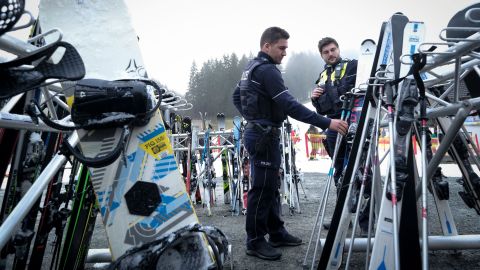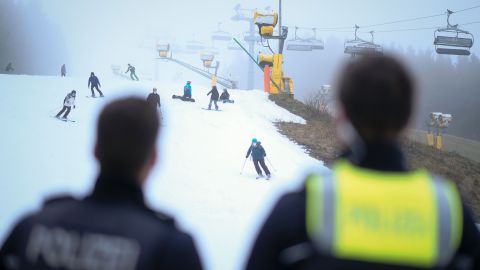In the high season, there is a Ballermann atmosphere here. Until a few years ago, there was also a police slope patrol. However, the tasks on the slopes are now mainly carried out by the mountain rescue service.
The fog hangs heavy over the slope on the Poppenberg. There is only a little artificial snow on the slopes. All around it is green and gray. Nevertheless, there is plenty of skiing activity on this Sunday just before Christmas. As is the case on almost every weekend between the beginning of December and the beginning of April.
Lifts, snow cannons, restaurants - the winter sports infrastructure in the Sauerland has become increasingly extensive in recent years. And this has also increased traffic problems in the region. The public flocks in from the conurbations on the Rhine and Ruhr. And when the Dutch get their crocus vacations in February, there is a lot going on.
Tourism is booming. Not just in winter. "Many youth groups rent houses in the vacation parks," reports Beermann. "And when the alcohol starts flowing, there can be trouble." Disturbing the peace is the least of the problems. There are regular arguments between Germans and Dutch people. "I don't want to judge who instigates them," says Beermann.
He comes from the area and has been on duty here for four years. His colleague Bücker has been here for three years and is a native of Winterberg. The fact that they are familiar with the area sometimes helps. They have a large area to cover from Winterberg. It can take them up to 35 minutes to travel from one end of their area of responsibility to the other. Sometimes they have 300 kilometers more on the speedometer at the end of their shift.
If things get dicey during an operation, the motto is "calm down and play for time". Because unlike in urban areas, it takes quite a while for reinforcements to arrive when needed. "We learn in our training that our voice is the most important operational tool," says Bücker. "That proves to be true here."
When the lockdown was imposed last winter, there was a lot to do. 30,000 to 40,000 people flocked to Hochsauerland every day to enjoy the snow. But the lifts weren't running, the restaurants were closed and there was a lack of public toilets. "It was adventurous," recalls department head Klaus Bunse. "Children were out in the snow with their families in completely unsuitable clothing." The exceptional situation lasted 14 days. The police responded to the onslaught with a special organizational structure. Even the equestrian squadron was deployed.
This winter, there have been repeated demonstrations by coronavirus deniers and vaccination sceptics in the Sauerland region. Initially they were registered, but they are increasingly taking place as unregistered "walks". Bunse: "Over 300 people now come together in some communities in the Hochsauerland district."
Lately, the drifter scene has been causing trouble - as a counterpart to speeders, tuners and posers in the Ruhr region or on the Rhine. At the beginning of December, for example, several police operations were repeatedly carried out because cars were skidding over snow and ice, turning circles and attracting crowds of onlookers. Over 500 vehicles were counted in various places and at various times - including in a parking lot in the ski resort.
A small number of cars that were obviously specially equipped for driving on rough terrain also attracted attention. "That was at 3 or 4 o'clock at night. They even had working lights on the cars and one had a winch on the car to pull others out if they got stuck," says Bunse. The police recorded 29 violations, including unnecessary driving back and forth and violations of no-passing zones.
The bobsleigh track. World and European Championships are held here, as well as regular World Cups in bobsleigh, luge and skeleton. However, it rarely attracts more than a few hundred visitors, even though sport at the highest Olympic level is on offer here. But with these events, Germany presents itself to the whole world via television. For this reason alone, it is important that the police do a good job here, emphasizes Beermann. And the sport is also dangerous.
In October, two 16-year-old girls from the German junior national team had an accident at high speed. The lugers suffered serious, but not life-threatening injuries and were flown to specialist clinics by rescue helicopter.
Next door, the downhill trails for mountain bikers are busy all year round. "The ambulance comes here every day," says Beermann. And the helicopter often comes here too. Things are high in the Hochsauerland region.

